University Business Law Case Study: Tesla Motors Canada ULC v Ontario
VerifiedAdded on 2022/08/13
|13
|3830
|15
Case Study
AI Summary
This case study analyzes the legal dispute between Tesla Motors Canada ULC and the Ontario government regarding the exclusion of Tesla from an electric car subsidy program. The assignment examines the key legal issues, including the application of the Public Transportation and Highway Improvement Act, 1990, and principles of the rule of law, such as justiciability, reasonable decision-making, and procedural fairness. The case explores whether the government's decision to exclude Tesla was justifiable and in compliance with the law, considering the implications of the decision on Tesla and its customers. The court's focus on justiciability, the government's discretionary powers, and the principles of fairness and reasonableness in decision-making are central to the analysis. The analysis also includes the application of relevant legal precedents and doctrines, such as the doctrine of justiciability and the importance of procedural fairness. The case highlights the importance of clear and unbiased government action in the administration of subsidy programs and the protection of businesses from arbitrary and unreasonable treatment.
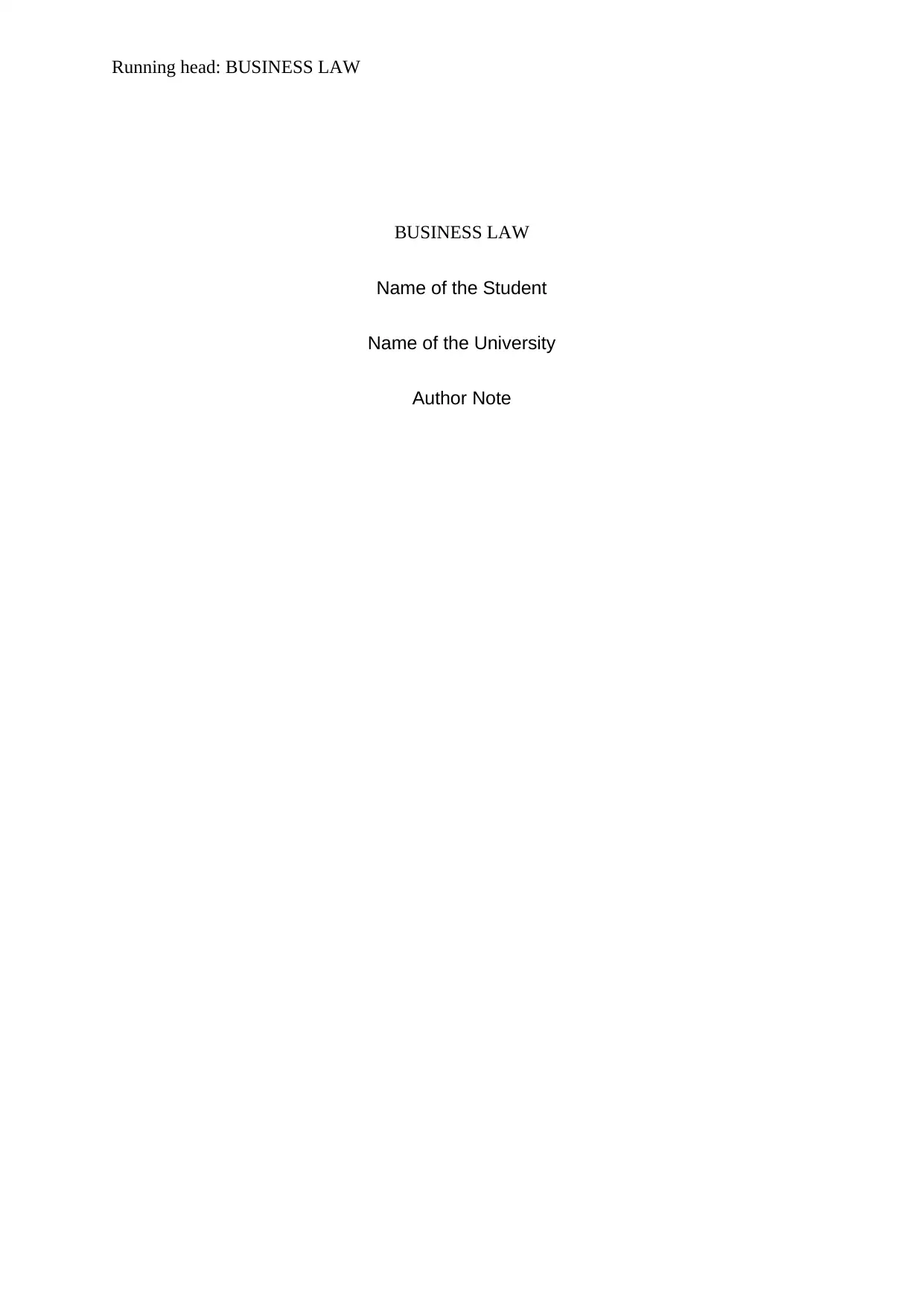
Running head: BUSINESS LAW
BUSINESS LAW
Name of the Student
Name of the University
Author Note
BUSINESS LAW
Name of the Student
Name of the University
Author Note
Paraphrase This Document
Need a fresh take? Get an instant paraphrase of this document with our AI Paraphraser
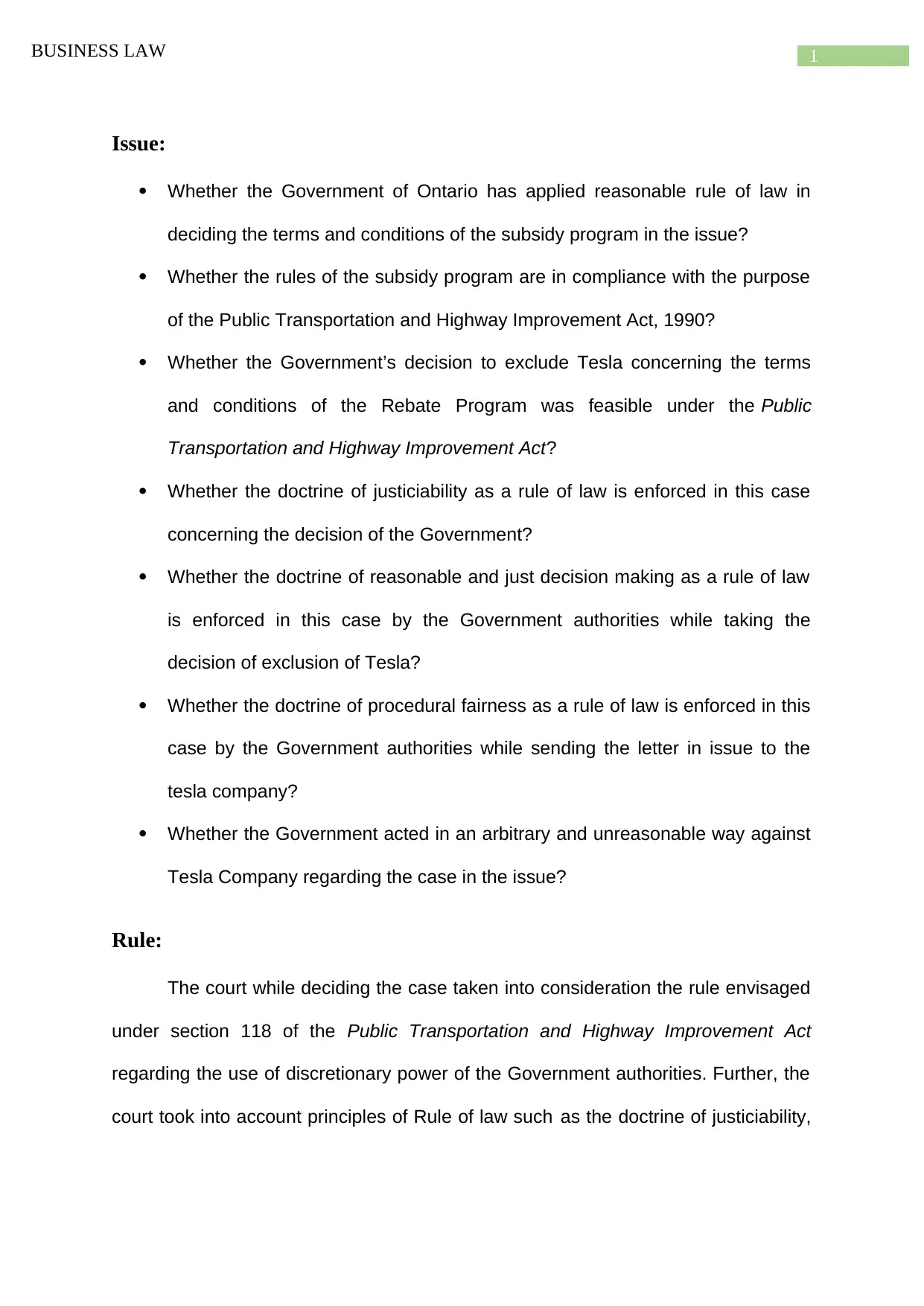
1BUSINESS LAW
Issue:
Whether the Government of Ontario has applied reasonable rule of law in
deciding the terms and conditions of the subsidy program in the issue?
Whether the rules of the subsidy program are in compliance with the purpose
of the Public Transportation and Highway Improvement Act, 1990?
Whether the Government’s decision to exclude Tesla concerning the terms
and conditions of the Rebate Program was feasible under the Public
Transportation and Highway Improvement Act?
Whether the doctrine of justiciability as a rule of law is enforced in this case
concerning the decision of the Government?
Whether the doctrine of reasonable and just decision making as a rule of law
is enforced in this case by the Government authorities while taking the
decision of exclusion of Tesla?
Whether the doctrine of procedural fairness as a rule of law is enforced in this
case by the Government authorities while sending the letter in issue to the
tesla company?
Whether the Government acted in an arbitrary and unreasonable way against
Tesla Company regarding the case in the issue?
Rule:
The court while deciding the case taken into consideration the rule envisaged
under section 118 of the Public Transportation and Highway Improvement Act
regarding the use of discretionary power of the Government authorities. Further, the
court took into account principles of Rule of law such as the doctrine of justiciability,
Issue:
Whether the Government of Ontario has applied reasonable rule of law in
deciding the terms and conditions of the subsidy program in the issue?
Whether the rules of the subsidy program are in compliance with the purpose
of the Public Transportation and Highway Improvement Act, 1990?
Whether the Government’s decision to exclude Tesla concerning the terms
and conditions of the Rebate Program was feasible under the Public
Transportation and Highway Improvement Act?
Whether the doctrine of justiciability as a rule of law is enforced in this case
concerning the decision of the Government?
Whether the doctrine of reasonable and just decision making as a rule of law
is enforced in this case by the Government authorities while taking the
decision of exclusion of Tesla?
Whether the doctrine of procedural fairness as a rule of law is enforced in this
case by the Government authorities while sending the letter in issue to the
tesla company?
Whether the Government acted in an arbitrary and unreasonable way against
Tesla Company regarding the case in the issue?
Rule:
The court while deciding the case taken into consideration the rule envisaged
under section 118 of the Public Transportation and Highway Improvement Act
regarding the use of discretionary power of the Government authorities. Further, the
court took into account principles of Rule of law such as the doctrine of justiciability,
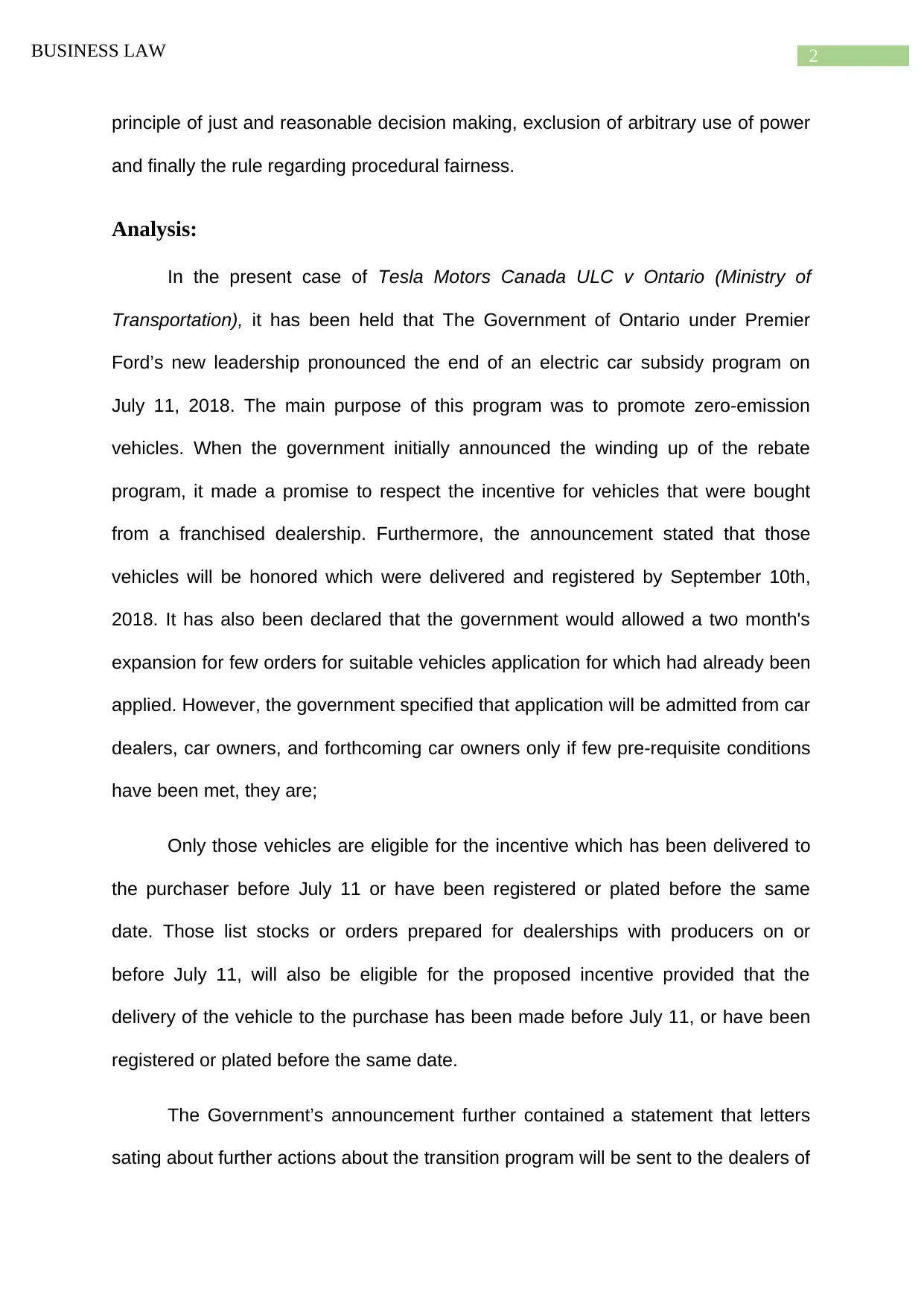
2BUSINESS LAW
principle of just and reasonable decision making, exclusion of arbitrary use of power
and finally the rule regarding procedural fairness.
Analysis:
In the present case of Tesla Motors Canada ULC v Ontario (Ministry of
Transportation), it has been held that The Government of Ontario under Premier
Ford’s new leadership pronounced the end of an electric car subsidy program on
July 11, 2018. The main purpose of this program was to promote zero-emission
vehicles. When the government initially announced the winding up of the rebate
program, it made a promise to respect the incentive for vehicles that were bought
from a franchised dealership. Furthermore, the announcement stated that those
vehicles will be honored which were delivered and registered by September 10th,
2018. It has also been declared that the government would allowed a two month's
expansion for few orders for suitable vehicles application for which had already been
applied. However, the government specified that application will be admitted from car
dealers, car owners, and forthcoming car owners only if few pre-requisite conditions
have been met, they are;
Only those vehicles are eligible for the incentive which has been delivered to
the purchaser before July 11 or have been registered or plated before the same
date. Those list stocks or orders prepared for dealerships with producers on or
before July 11, will also be eligible for the proposed incentive provided that the
delivery of the vehicle to the purchase has been made before July 11, or have been
registered or plated before the same date.
The Government’s announcement further contained a statement that letters
sating about further actions about the transition program will be sent to the dealers of
principle of just and reasonable decision making, exclusion of arbitrary use of power
and finally the rule regarding procedural fairness.
Analysis:
In the present case of Tesla Motors Canada ULC v Ontario (Ministry of
Transportation), it has been held that The Government of Ontario under Premier
Ford’s new leadership pronounced the end of an electric car subsidy program on
July 11, 2018. The main purpose of this program was to promote zero-emission
vehicles. When the government initially announced the winding up of the rebate
program, it made a promise to respect the incentive for vehicles that were bought
from a franchised dealership. Furthermore, the announcement stated that those
vehicles will be honored which were delivered and registered by September 10th,
2018. It has also been declared that the government would allowed a two month's
expansion for few orders for suitable vehicles application for which had already been
applied. However, the government specified that application will be admitted from car
dealers, car owners, and forthcoming car owners only if few pre-requisite conditions
have been met, they are;
Only those vehicles are eligible for the incentive which has been delivered to
the purchaser before July 11 or have been registered or plated before the same
date. Those list stocks or orders prepared for dealerships with producers on or
before July 11, will also be eligible for the proposed incentive provided that the
delivery of the vehicle to the purchase has been made before July 11, or have been
registered or plated before the same date.
The Government’s announcement further contained a statement that letters
sating about further actions about the transition program will be sent to the dealers of
⊘ This is a preview!⊘
Do you want full access?
Subscribe today to unlock all pages.

Trusted by 1+ million students worldwide
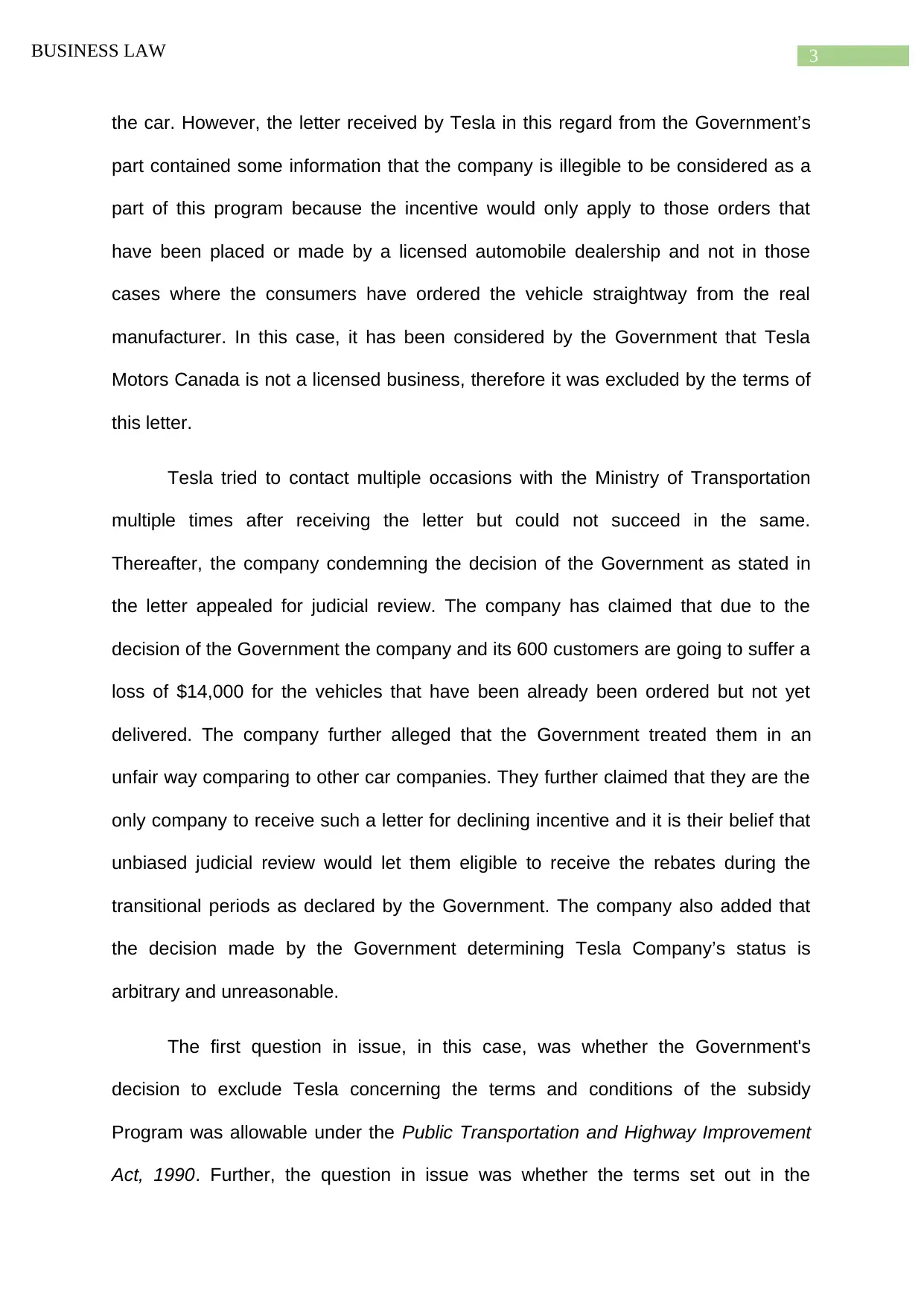
3BUSINESS LAW
the car. However, the letter received by Tesla in this regard from the Government’s
part contained some information that the company is illegible to be considered as a
part of this program because the incentive would only apply to those orders that
have been placed or made by a licensed automobile dealership and not in those
cases where the consumers have ordered the vehicle straightway from the real
manufacturer. In this case, it has been considered by the Government that Tesla
Motors Canada is not a licensed business, therefore it was excluded by the terms of
this letter.
Tesla tried to contact multiple occasions with the Ministry of Transportation
multiple times after receiving the letter but could not succeed in the same.
Thereafter, the company condemning the decision of the Government as stated in
the letter appealed for judicial review. The company has claimed that due to the
decision of the Government the company and its 600 customers are going to suffer a
loss of $14,000 for the vehicles that have been already been ordered but not yet
delivered. The company further alleged that the Government treated them in an
unfair way comparing to other car companies. They further claimed that they are the
only company to receive such a letter for declining incentive and it is their belief that
unbiased judicial review would let them eligible to receive the rebates during the
transitional periods as declared by the Government. The company also added that
the decision made by the Government determining Tesla Company’s status is
arbitrary and unreasonable.
The first question in issue, in this case, was whether the Government's
decision to exclude Tesla concerning the terms and conditions of the subsidy
Program was allowable under the Public Transportation and Highway Improvement
Act, 1990. Further, the question in issue was whether the terms set out in the
the car. However, the letter received by Tesla in this regard from the Government’s
part contained some information that the company is illegible to be considered as a
part of this program because the incentive would only apply to those orders that
have been placed or made by a licensed automobile dealership and not in those
cases where the consumers have ordered the vehicle straightway from the real
manufacturer. In this case, it has been considered by the Government that Tesla
Motors Canada is not a licensed business, therefore it was excluded by the terms of
this letter.
Tesla tried to contact multiple occasions with the Ministry of Transportation
multiple times after receiving the letter but could not succeed in the same.
Thereafter, the company condemning the decision of the Government as stated in
the letter appealed for judicial review. The company has claimed that due to the
decision of the Government the company and its 600 customers are going to suffer a
loss of $14,000 for the vehicles that have been already been ordered but not yet
delivered. The company further alleged that the Government treated them in an
unfair way comparing to other car companies. They further claimed that they are the
only company to receive such a letter for declining incentive and it is their belief that
unbiased judicial review would let them eligible to receive the rebates during the
transitional periods as declared by the Government. The company also added that
the decision made by the Government determining Tesla Company’s status is
arbitrary and unreasonable.
The first question in issue, in this case, was whether the Government's
decision to exclude Tesla concerning the terms and conditions of the subsidy
Program was allowable under the Public Transportation and Highway Improvement
Act, 1990. Further, the question in issue was whether the terms set out in the
Paraphrase This Document
Need a fresh take? Get an instant paraphrase of this document with our AI Paraphraser
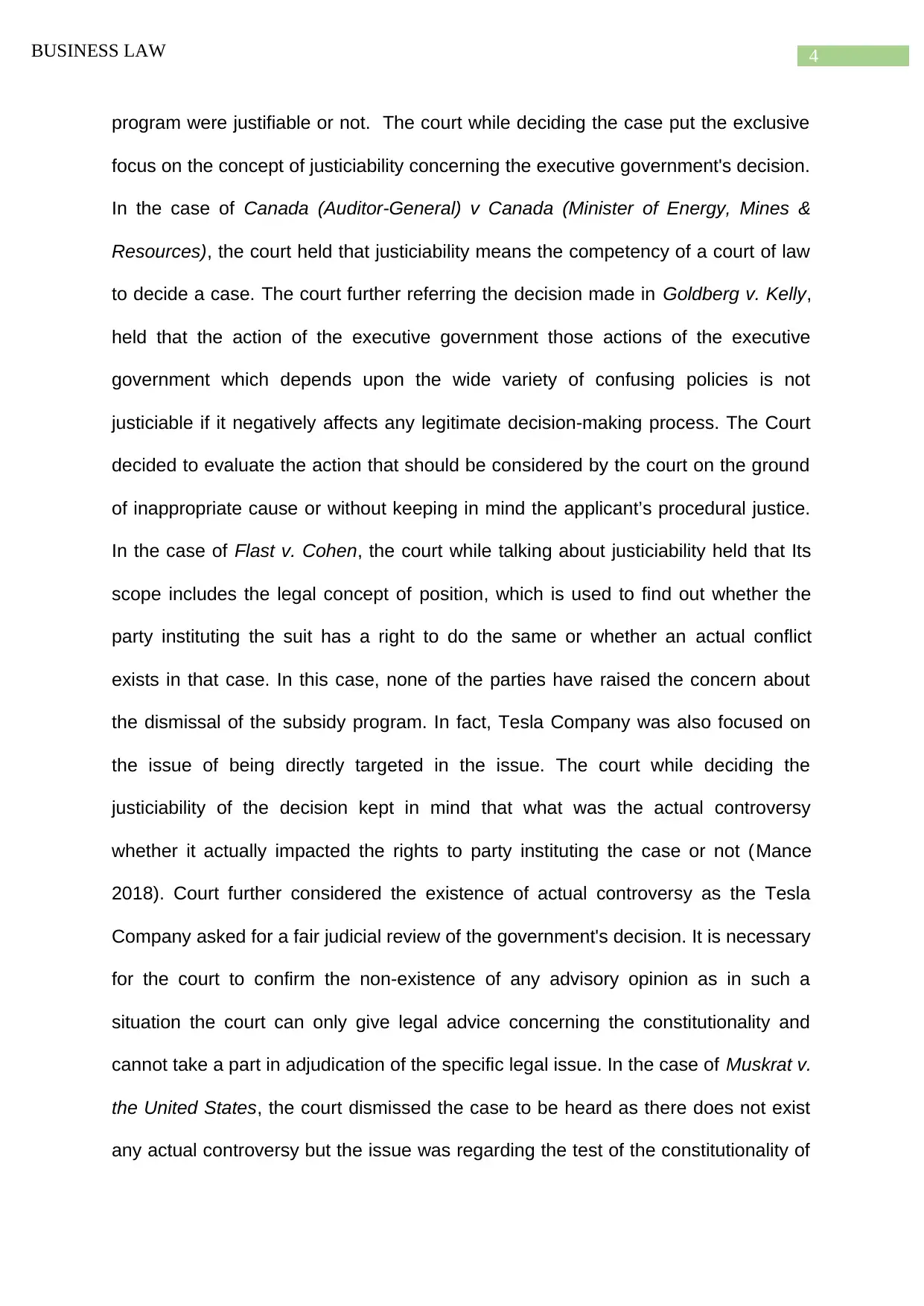
4BUSINESS LAW
program were justifiable or not. The court while deciding the case put the exclusive
focus on the concept of justiciability concerning the executive government's decision.
In the case of Canada (Auditor-General) v Canada (Minister of Energy, Mines &
Resources), the court held that justiciability means the competency of a court of law
to decide a case. The court further referring the decision made in Goldberg v. Kelly,
held that the action of the executive government those actions of the executive
government which depends upon the wide variety of confusing policies is not
justiciable if it negatively affects any legitimate decision-making process. The Court
decided to evaluate the action that should be considered by the court on the ground
of inappropriate cause or without keeping in mind the applicant’s procedural justice.
In the case of Flast v. Cohen, the court while talking about justiciability held that Its
scope includes the legal concept of position, which is used to find out whether the
party instituting the suit has a right to do the same or whether an actual conflict
exists in that case. In this case, none of the parties have raised the concern about
the dismissal of the subsidy program. In fact, Tesla Company was also focused on
the issue of being directly targeted in the issue. The court while deciding the
justiciability of the decision kept in mind that what was the actual controversy
whether it actually impacted the rights to party instituting the case or not (Mance
2018). Court further considered the existence of actual controversy as the Tesla
Company asked for a fair judicial review of the government's decision. It is necessary
for the court to confirm the non-existence of any advisory opinion as in such a
situation the court can only give legal advice concerning the constitutionality and
cannot take a part in adjudication of the specific legal issue. In the case of Muskrat v.
the United States, the court dismissed the case to be heard as there does not exist
any actual controversy but the issue was regarding the test of the constitutionality of
program were justifiable or not. The court while deciding the case put the exclusive
focus on the concept of justiciability concerning the executive government's decision.
In the case of Canada (Auditor-General) v Canada (Minister of Energy, Mines &
Resources), the court held that justiciability means the competency of a court of law
to decide a case. The court further referring the decision made in Goldberg v. Kelly,
held that the action of the executive government those actions of the executive
government which depends upon the wide variety of confusing policies is not
justiciable if it negatively affects any legitimate decision-making process. The Court
decided to evaluate the action that should be considered by the court on the ground
of inappropriate cause or without keeping in mind the applicant’s procedural justice.
In the case of Flast v. Cohen, the court while talking about justiciability held that Its
scope includes the legal concept of position, which is used to find out whether the
party instituting the suit has a right to do the same or whether an actual conflict
exists in that case. In this case, none of the parties have raised the concern about
the dismissal of the subsidy program. In fact, Tesla Company was also focused on
the issue of being directly targeted in the issue. The court while deciding the
justiciability of the decision kept in mind that what was the actual controversy
whether it actually impacted the rights to party instituting the case or not (Mance
2018). Court further considered the existence of actual controversy as the Tesla
Company asked for a fair judicial review of the government's decision. It is necessary
for the court to confirm the non-existence of any advisory opinion as in such a
situation the court can only give legal advice concerning the constitutionality and
cannot take a part in adjudication of the specific legal issue. In the case of Muskrat v.
the United States, the court dismissed the case to be heard as there does not exist
any actual controversy but the issue was regarding the test of the constitutionality of
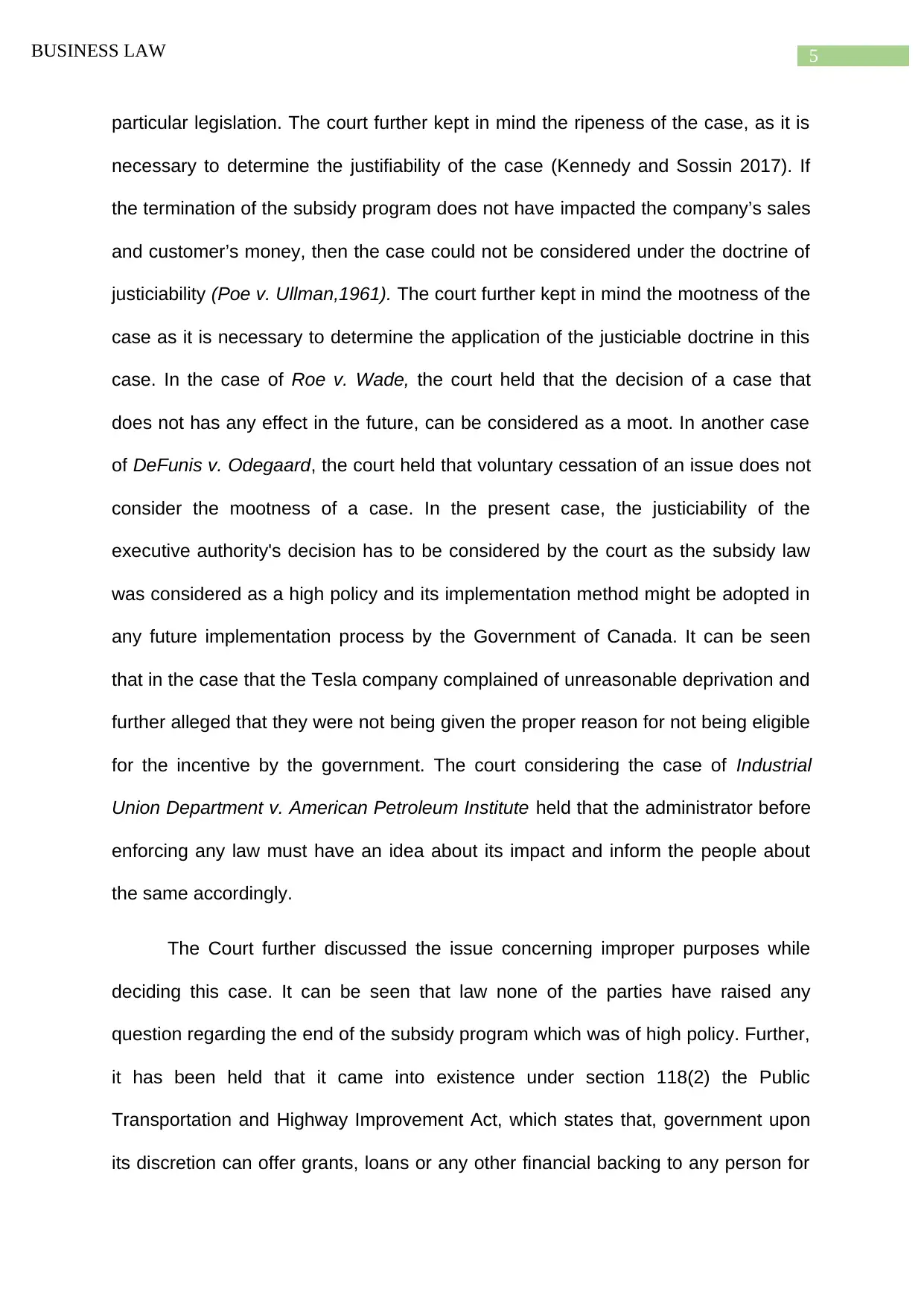
5BUSINESS LAW
particular legislation. The court further kept in mind the ripeness of the case, as it is
necessary to determine the justifiability of the case (Kennedy and Sossin 2017). If
the termination of the subsidy program does not have impacted the company’s sales
and customer’s money, then the case could not be considered under the doctrine of
justiciability (Poe v. Ullman,1961). The court further kept in mind the mootness of the
case as it is necessary to determine the application of the justiciable doctrine in this
case. In the case of Roe v. Wade, the court held that the decision of a case that
does not has any effect in the future, can be considered as a moot. In another case
of DeFunis v. Odegaard, the court held that voluntary cessation of an issue does not
consider the mootness of a case. In the present case, the justiciability of the
executive authority's decision has to be considered by the court as the subsidy law
was considered as a high policy and its implementation method might be adopted in
any future implementation process by the Government of Canada. It can be seen
that in the case that the Tesla company complained of unreasonable deprivation and
further alleged that they were not being given the proper reason for not being eligible
for the incentive by the government. The court considering the case of Industrial
Union Department v. American Petroleum Institute held that the administrator before
enforcing any law must have an idea about its impact and inform the people about
the same accordingly.
The Court further discussed the issue concerning improper purposes while
deciding this case. It can be seen that law none of the parties have raised any
question regarding the end of the subsidy program which was of high policy. Further,
it has been held that it came into existence under section 118(2) the Public
Transportation and Highway Improvement Act, which states that, government upon
its discretion can offer grants, loans or any other financial backing to any person for
particular legislation. The court further kept in mind the ripeness of the case, as it is
necessary to determine the justifiability of the case (Kennedy and Sossin 2017). If
the termination of the subsidy program does not have impacted the company’s sales
and customer’s money, then the case could not be considered under the doctrine of
justiciability (Poe v. Ullman,1961). The court further kept in mind the mootness of the
case as it is necessary to determine the application of the justiciable doctrine in this
case. In the case of Roe v. Wade, the court held that the decision of a case that
does not has any effect in the future, can be considered as a moot. In another case
of DeFunis v. Odegaard, the court held that voluntary cessation of an issue does not
consider the mootness of a case. In the present case, the justiciability of the
executive authority's decision has to be considered by the court as the subsidy law
was considered as a high policy and its implementation method might be adopted in
any future implementation process by the Government of Canada. It can be seen
that in the case that the Tesla company complained of unreasonable deprivation and
further alleged that they were not being given the proper reason for not being eligible
for the incentive by the government. The court considering the case of Industrial
Union Department v. American Petroleum Institute held that the administrator before
enforcing any law must have an idea about its impact and inform the people about
the same accordingly.
The Court further discussed the issue concerning improper purposes while
deciding this case. It can be seen that law none of the parties have raised any
question regarding the end of the subsidy program which was of high policy. Further,
it has been held that it came into existence under section 118(2) the Public
Transportation and Highway Improvement Act, which states that, government upon
its discretion can offer grants, loans or any other financial backing to any person for
⊘ This is a preview!⊘
Do you want full access?
Subscribe today to unlock all pages.

Trusted by 1+ million students worldwide
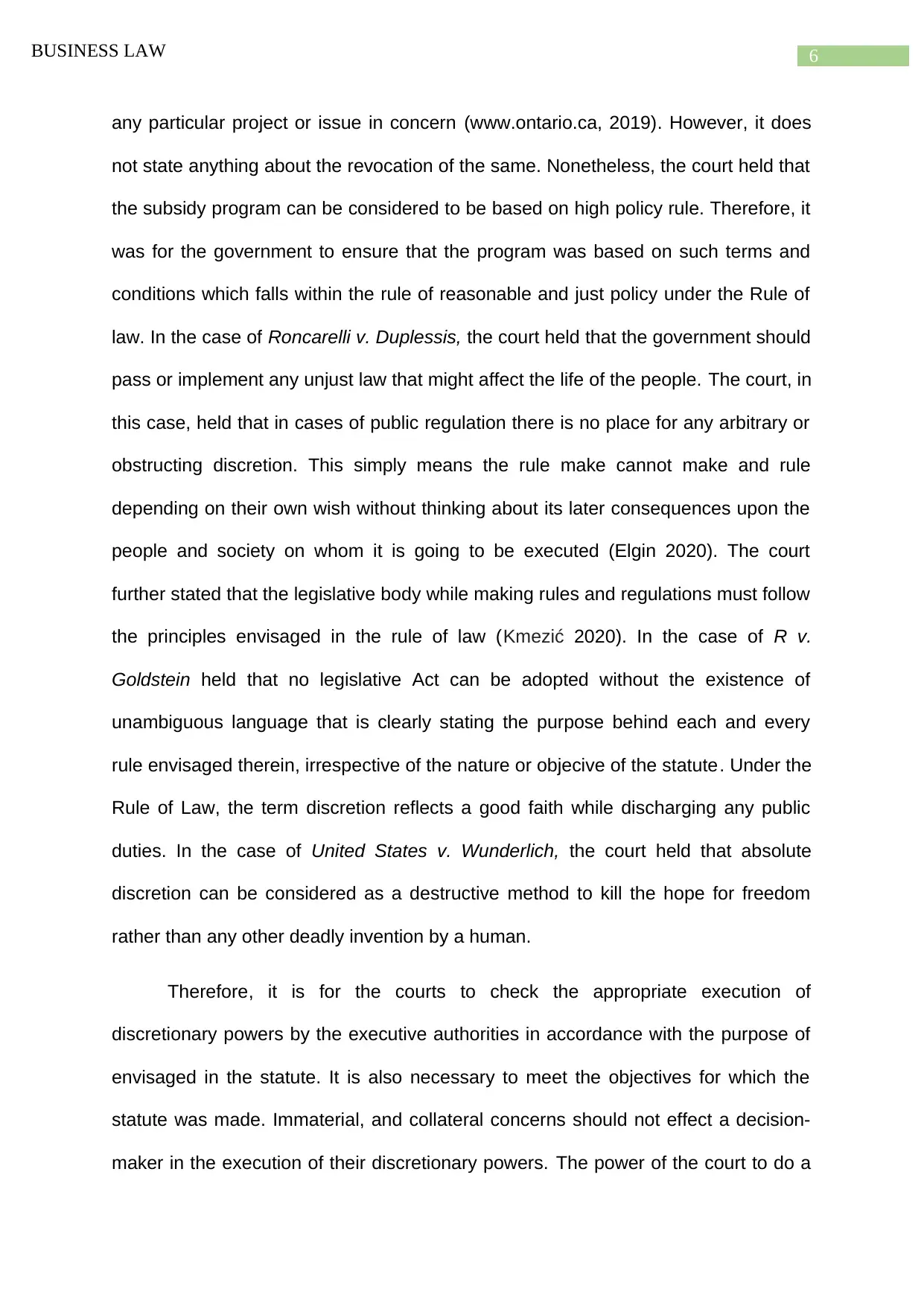
6BUSINESS LAW
any particular project or issue in concern (www.ontario.ca, 2019). However, it does
not state anything about the revocation of the same. Nonetheless, the court held that
the subsidy program can be considered to be based on high policy rule. Therefore, it
was for the government to ensure that the program was based on such terms and
conditions which falls within the rule of reasonable and just policy under the Rule of
law. In the case of Roncarelli v. Duplessis, the court held that the government should
pass or implement any unjust law that might affect the life of the people. The court, in
this case, held that in cases of public regulation there is no place for any arbitrary or
obstructing discretion. This simply means the rule make cannot make and rule
depending on their own wish without thinking about its later consequences upon the
people and society on whom it is going to be executed (Elgin 2020). The court
further stated that the legislative body while making rules and regulations must follow
the principles envisaged in the rule of law (Kmezić 2020). In the case of R v.
Goldstein held that no legislative Act can be adopted without the existence of
unambiguous language that is clearly stating the purpose behind each and every
rule envisaged therein, irrespective of the nature or objecive of the statute. Under the
Rule of Law, the term discretion reflects a good faith while discharging any public
duties. In the case of United States v. Wunderlich, the court held that absolute
discretion can be considered as a destructive method to kill the hope for freedom
rather than any other deadly invention by a human.
Therefore, it is for the courts to check the appropriate execution of
discretionary powers by the executive authorities in accordance with the purpose of
envisaged in the statute. It is also necessary to meet the objectives for which the
statute was made. Immaterial, and collateral concerns should not effect a decision-
maker in the execution of their discretionary powers. The power of the court to do a
any particular project or issue in concern (www.ontario.ca, 2019). However, it does
not state anything about the revocation of the same. Nonetheless, the court held that
the subsidy program can be considered to be based on high policy rule. Therefore, it
was for the government to ensure that the program was based on such terms and
conditions which falls within the rule of reasonable and just policy under the Rule of
law. In the case of Roncarelli v. Duplessis, the court held that the government should
pass or implement any unjust law that might affect the life of the people. The court, in
this case, held that in cases of public regulation there is no place for any arbitrary or
obstructing discretion. This simply means the rule make cannot make and rule
depending on their own wish without thinking about its later consequences upon the
people and society on whom it is going to be executed (Elgin 2020). The court
further stated that the legislative body while making rules and regulations must follow
the principles envisaged in the rule of law (Kmezić 2020). In the case of R v.
Goldstein held that no legislative Act can be adopted without the existence of
unambiguous language that is clearly stating the purpose behind each and every
rule envisaged therein, irrespective of the nature or objecive of the statute. Under the
Rule of Law, the term discretion reflects a good faith while discharging any public
duties. In the case of United States v. Wunderlich, the court held that absolute
discretion can be considered as a destructive method to kill the hope for freedom
rather than any other deadly invention by a human.
Therefore, it is for the courts to check the appropriate execution of
discretionary powers by the executive authorities in accordance with the purpose of
envisaged in the statute. It is also necessary to meet the objectives for which the
statute was made. Immaterial, and collateral concerns should not effect a decision-
maker in the execution of their discretionary powers. The power of the court to do a
Paraphrase This Document
Need a fresh take? Get an instant paraphrase of this document with our AI Paraphraser
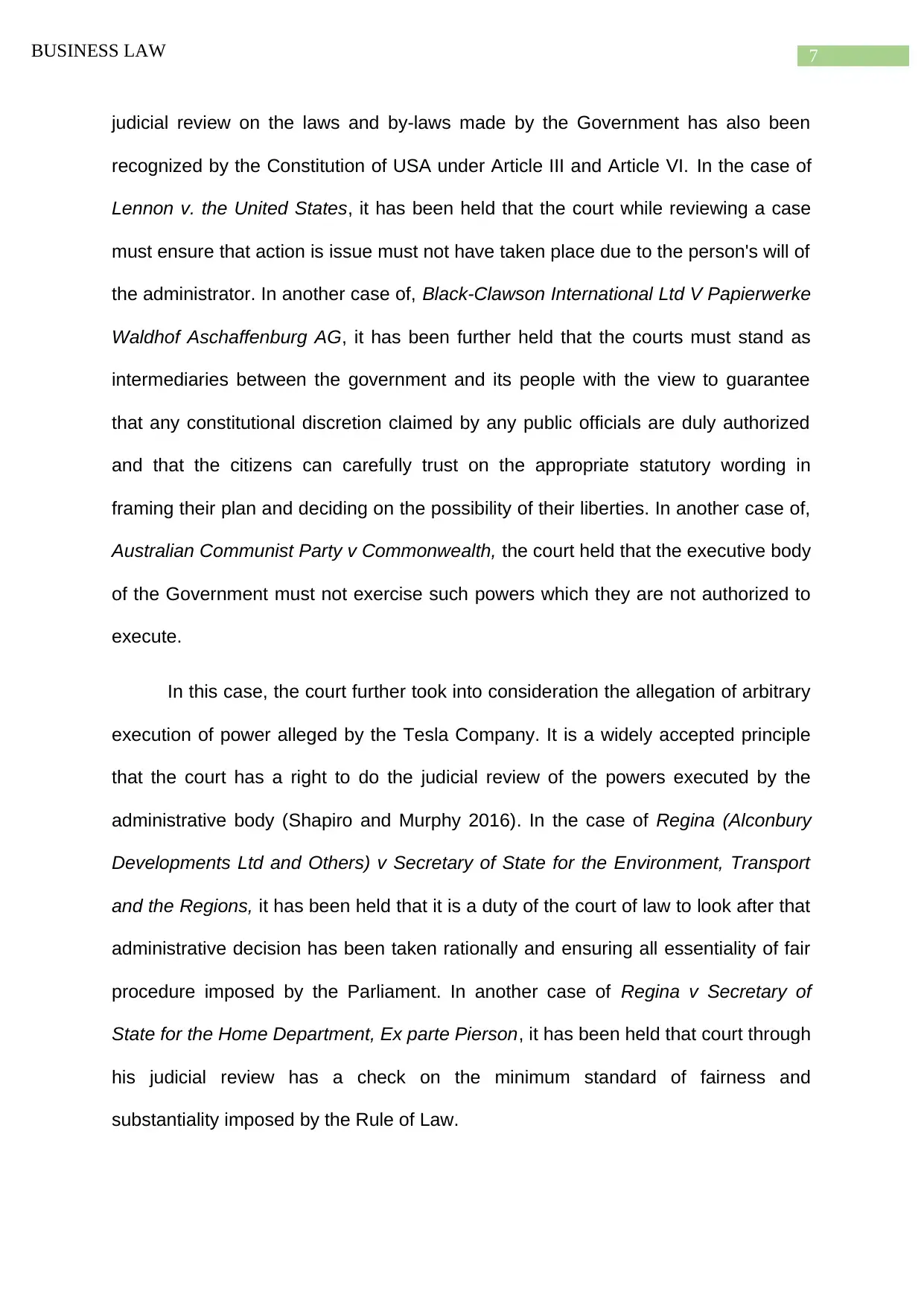
7BUSINESS LAW
judicial review on the laws and by-laws made by the Government has also been
recognized by the Constitution of USA under Article III and Article VI. In the case of
Lennon v. the United States, it has been held that the court while reviewing a case
must ensure that action is issue must not have taken place due to the person's will of
the administrator. In another case of, Black-Clawson International Ltd V Papierwerke
Waldhof Aschaffenburg AG, it has been further held that the courts must stand as
intermediaries between the government and its people with the view to guarantee
that any constitutional discretion claimed by any public officials are duly authorized
and that the citizens can carefully trust on the appropriate statutory wording in
framing their plan and deciding on the possibility of their liberties. In another case of,
Australian Communist Party v Commonwealth, the court held that the executive body
of the Government must not exercise such powers which they are not authorized to
execute.
In this case, the court further took into consideration the allegation of arbitrary
execution of power alleged by the Tesla Company. It is a widely accepted principle
that the court has a right to do the judicial review of the powers executed by the
administrative body (Shapiro and Murphy 2016). In the case of Regina (Alconbury
Developments Ltd and Others) v Secretary of State for the Environment, Transport
and the Regions, it has been held that it is a duty of the court of law to look after that
administrative decision has been taken rationally and ensuring all essentiality of fair
procedure imposed by the Parliament. In another case of Regina v Secretary of
State for the Home Department, Ex parte Pierson, it has been held that court through
his judicial review has a check on the minimum standard of fairness and
substantiality imposed by the Rule of Law.
judicial review on the laws and by-laws made by the Government has also been
recognized by the Constitution of USA under Article III and Article VI. In the case of
Lennon v. the United States, it has been held that the court while reviewing a case
must ensure that action is issue must not have taken place due to the person's will of
the administrator. In another case of, Black-Clawson International Ltd V Papierwerke
Waldhof Aschaffenburg AG, it has been further held that the courts must stand as
intermediaries between the government and its people with the view to guarantee
that any constitutional discretion claimed by any public officials are duly authorized
and that the citizens can carefully trust on the appropriate statutory wording in
framing their plan and deciding on the possibility of their liberties. In another case of,
Australian Communist Party v Commonwealth, the court held that the executive body
of the Government must not exercise such powers which they are not authorized to
execute.
In this case, the court further took into consideration the allegation of arbitrary
execution of power alleged by the Tesla Company. It is a widely accepted principle
that the court has a right to do the judicial review of the powers executed by the
administrative body (Shapiro and Murphy 2016). In the case of Regina (Alconbury
Developments Ltd and Others) v Secretary of State for the Environment, Transport
and the Regions, it has been held that it is a duty of the court of law to look after that
administrative decision has been taken rationally and ensuring all essentiality of fair
procedure imposed by the Parliament. In another case of Regina v Secretary of
State for the Home Department, Ex parte Pierson, it has been held that court through
his judicial review has a check on the minimum standard of fairness and
substantiality imposed by the Rule of Law.
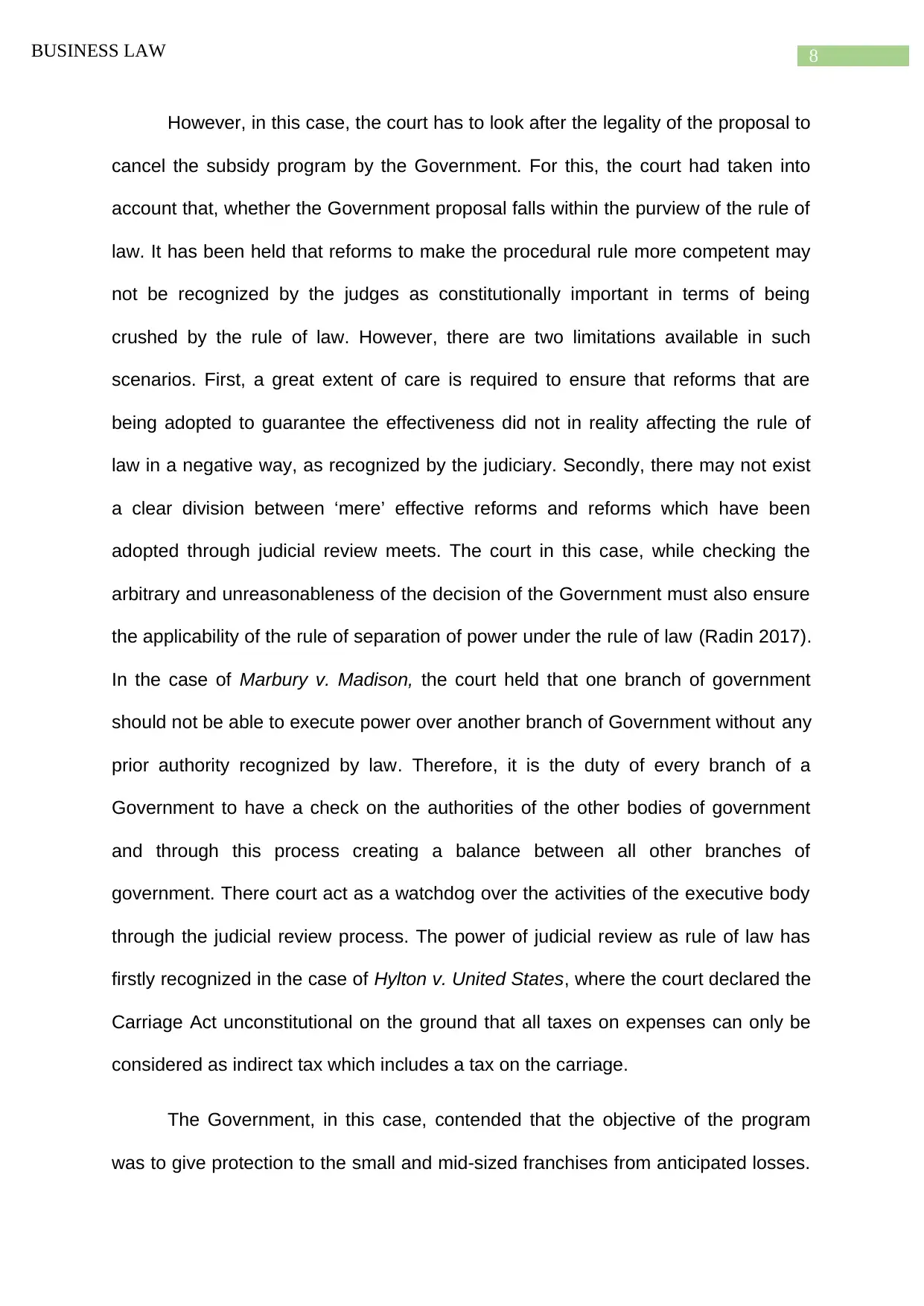
8BUSINESS LAW
However, in this case, the court has to look after the legality of the proposal to
cancel the subsidy program by the Government. For this, the court had taken into
account that, whether the Government proposal falls within the purview of the rule of
law. It has been held that reforms to make the procedural rule more competent may
not be recognized by the judges as constitutionally important in terms of being
crushed by the rule of law. However, there are two limitations available in such
scenarios. First, a great extent of care is required to ensure that reforms that are
being adopted to guarantee the effectiveness did not in reality affecting the rule of
law in a negative way, as recognized by the judiciary. Secondly, there may not exist
a clear division between ‘mere’ effective reforms and reforms which have been
adopted through judicial review meets. The court in this case, while checking the
arbitrary and unreasonableness of the decision of the Government must also ensure
the applicability of the rule of separation of power under the rule of law (Radin 2017).
In the case of Marbury v. Madison, the court held that one branch of government
should not be able to execute power over another branch of Government without any
prior authority recognized by law. Therefore, it is the duty of every branch of a
Government to have a check on the authorities of the other bodies of government
and through this process creating a balance between all other branches of
government. There court act as a watchdog over the activities of the executive body
through the judicial review process. The power of judicial review as rule of law has
firstly recognized in the case of Hylton v. United States, where the court declared the
Carriage Act unconstitutional on the ground that all taxes on expenses can only be
considered as indirect tax which includes a tax on the carriage.
The Government, in this case, contended that the objective of the program
was to give protection to the small and mid-sized franchises from anticipated losses.
However, in this case, the court has to look after the legality of the proposal to
cancel the subsidy program by the Government. For this, the court had taken into
account that, whether the Government proposal falls within the purview of the rule of
law. It has been held that reforms to make the procedural rule more competent may
not be recognized by the judges as constitutionally important in terms of being
crushed by the rule of law. However, there are two limitations available in such
scenarios. First, a great extent of care is required to ensure that reforms that are
being adopted to guarantee the effectiveness did not in reality affecting the rule of
law in a negative way, as recognized by the judiciary. Secondly, there may not exist
a clear division between ‘mere’ effective reforms and reforms which have been
adopted through judicial review meets. The court in this case, while checking the
arbitrary and unreasonableness of the decision of the Government must also ensure
the applicability of the rule of separation of power under the rule of law (Radin 2017).
In the case of Marbury v. Madison, the court held that one branch of government
should not be able to execute power over another branch of Government without any
prior authority recognized by law. Therefore, it is the duty of every branch of a
Government to have a check on the authorities of the other bodies of government
and through this process creating a balance between all other branches of
government. There court act as a watchdog over the activities of the executive body
through the judicial review process. The power of judicial review as rule of law has
firstly recognized in the case of Hylton v. United States, where the court declared the
Carriage Act unconstitutional on the ground that all taxes on expenses can only be
considered as indirect tax which includes a tax on the carriage.
The Government, in this case, contended that the objective of the program
was to give protection to the small and mid-sized franchises from anticipated losses.
⊘ This is a preview!⊘
Do you want full access?
Subscribe today to unlock all pages.

Trusted by 1+ million students worldwide
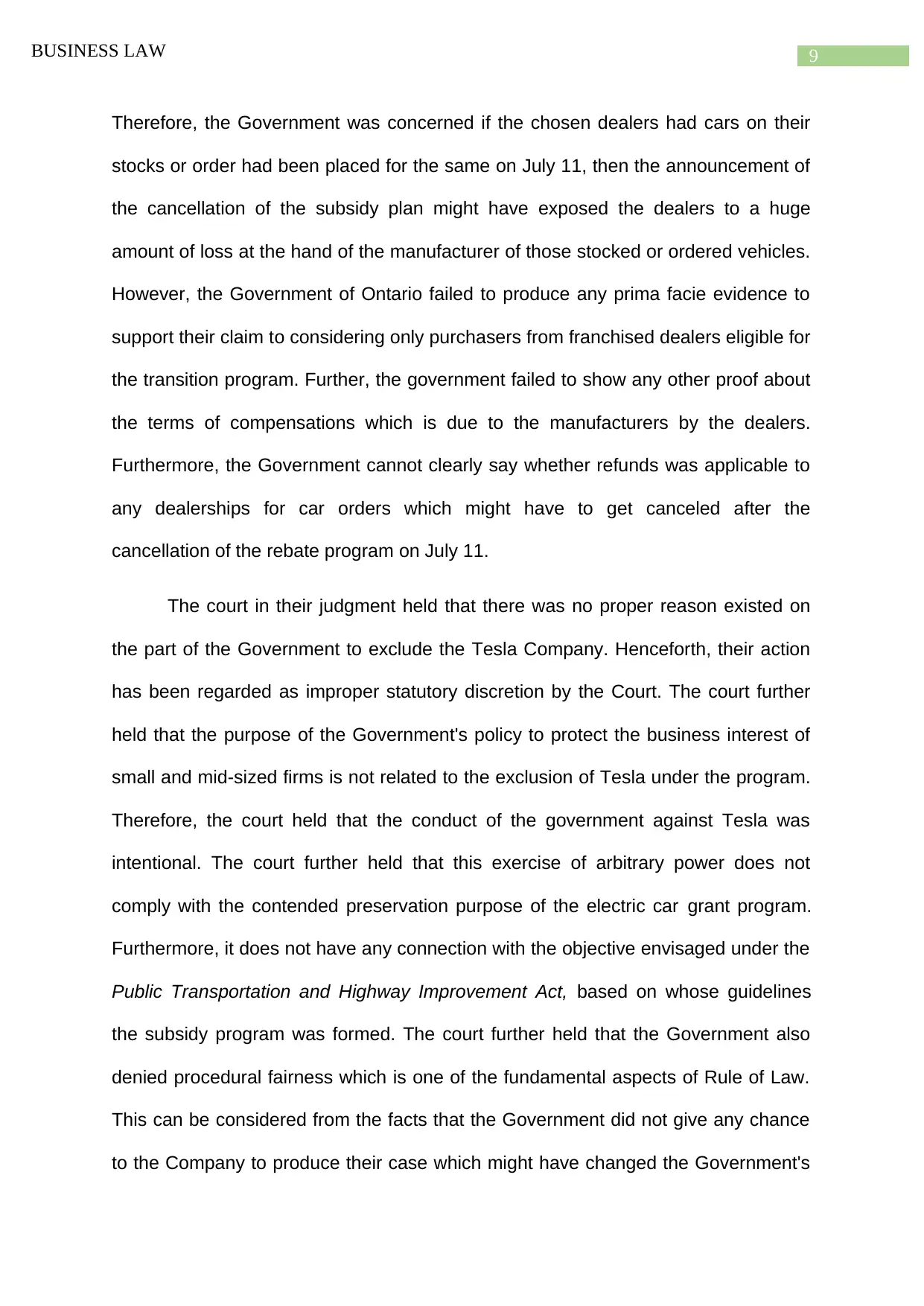
9BUSINESS LAW
Therefore, the Government was concerned if the chosen dealers had cars on their
stocks or order had been placed for the same on July 11, then the announcement of
the cancellation of the subsidy plan might have exposed the dealers to a huge
amount of loss at the hand of the manufacturer of those stocked or ordered vehicles.
However, the Government of Ontario failed to produce any prima facie evidence to
support their claim to considering only purchasers from franchised dealers eligible for
the transition program. Further, the government failed to show any other proof about
the terms of compensations which is due to the manufacturers by the dealers.
Furthermore, the Government cannot clearly say whether refunds was applicable to
any dealerships for car orders which might have to get canceled after the
cancellation of the rebate program on July 11.
The court in their judgment held that there was no proper reason existed on
the part of the Government to exclude the Tesla Company. Henceforth, their action
has been regarded as improper statutory discretion by the Court. The court further
held that the purpose of the Government's policy to protect the business interest of
small and mid-sized firms is not related to the exclusion of Tesla under the program.
Therefore, the court held that the conduct of the government against Tesla was
intentional. The court further held that this exercise of arbitrary power does not
comply with the contended preservation purpose of the electric car grant program.
Furthermore, it does not have any connection with the objective envisaged under the
Public Transportation and Highway Improvement Act, based on whose guidelines
the subsidy program was formed. The court further held that the Government also
denied procedural fairness which is one of the fundamental aspects of Rule of Law.
This can be considered from the facts that the Government did not give any chance
to the Company to produce their case which might have changed the Government's
Therefore, the Government was concerned if the chosen dealers had cars on their
stocks or order had been placed for the same on July 11, then the announcement of
the cancellation of the subsidy plan might have exposed the dealers to a huge
amount of loss at the hand of the manufacturer of those stocked or ordered vehicles.
However, the Government of Ontario failed to produce any prima facie evidence to
support their claim to considering only purchasers from franchised dealers eligible for
the transition program. Further, the government failed to show any other proof about
the terms of compensations which is due to the manufacturers by the dealers.
Furthermore, the Government cannot clearly say whether refunds was applicable to
any dealerships for car orders which might have to get canceled after the
cancellation of the rebate program on July 11.
The court in their judgment held that there was no proper reason existed on
the part of the Government to exclude the Tesla Company. Henceforth, their action
has been regarded as improper statutory discretion by the Court. The court further
held that the purpose of the Government's policy to protect the business interest of
small and mid-sized firms is not related to the exclusion of Tesla under the program.
Therefore, the court held that the conduct of the government against Tesla was
intentional. The court further held that this exercise of arbitrary power does not
comply with the contended preservation purpose of the electric car grant program.
Furthermore, it does not have any connection with the objective envisaged under the
Public Transportation and Highway Improvement Act, based on whose guidelines
the subsidy program was formed. The court further held that the Government also
denied procedural fairness which is one of the fundamental aspects of Rule of Law.
This can be considered from the facts that the Government did not give any chance
to the Company to produce their case which might have changed the Government's
Paraphrase This Document
Need a fresh take? Get an instant paraphrase of this document with our AI Paraphraser
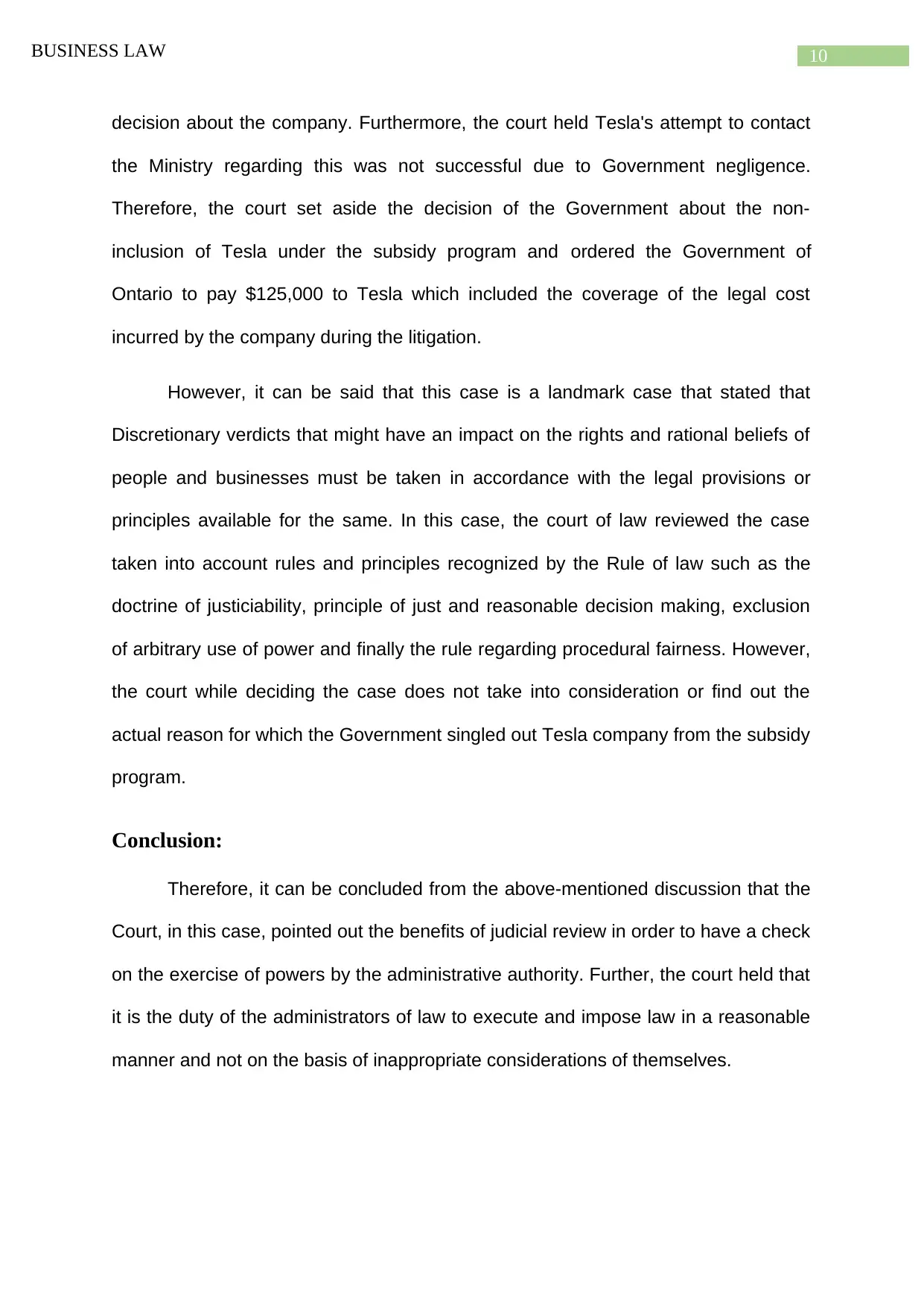
10BUSINESS LAW
decision about the company. Furthermore, the court held Tesla's attempt to contact
the Ministry regarding this was not successful due to Government negligence.
Therefore, the court set aside the decision of the Government about the non-
inclusion of Tesla under the subsidy program and ordered the Government of
Ontario to pay $125,000 to Tesla which included the coverage of the legal cost
incurred by the company during the litigation.
However, it can be said that this case is a landmark case that stated that
Discretionary verdicts that might have an impact on the rights and rational beliefs of
people and businesses must be taken in accordance with the legal provisions or
principles available for the same. In this case, the court of law reviewed the case
taken into account rules and principles recognized by the Rule of law such as the
doctrine of justiciability, principle of just and reasonable decision making, exclusion
of arbitrary use of power and finally the rule regarding procedural fairness. However,
the court while deciding the case does not take into consideration or find out the
actual reason for which the Government singled out Tesla company from the subsidy
program.
Conclusion:
Therefore, it can be concluded from the above-mentioned discussion that the
Court, in this case, pointed out the benefits of judicial review in order to have a check
on the exercise of powers by the administrative authority. Further, the court held that
it is the duty of the administrators of law to execute and impose law in a reasonable
manner and not on the basis of inappropriate considerations of themselves.
decision about the company. Furthermore, the court held Tesla's attempt to contact
the Ministry regarding this was not successful due to Government negligence.
Therefore, the court set aside the decision of the Government about the non-
inclusion of Tesla under the subsidy program and ordered the Government of
Ontario to pay $125,000 to Tesla which included the coverage of the legal cost
incurred by the company during the litigation.
However, it can be said that this case is a landmark case that stated that
Discretionary verdicts that might have an impact on the rights and rational beliefs of
people and businesses must be taken in accordance with the legal provisions or
principles available for the same. In this case, the court of law reviewed the case
taken into account rules and principles recognized by the Rule of law such as the
doctrine of justiciability, principle of just and reasonable decision making, exclusion
of arbitrary use of power and finally the rule regarding procedural fairness. However,
the court while deciding the case does not take into consideration or find out the
actual reason for which the Government singled out Tesla company from the subsidy
program.
Conclusion:
Therefore, it can be concluded from the above-mentioned discussion that the
Court, in this case, pointed out the benefits of judicial review in order to have a check
on the exercise of powers by the administrative authority. Further, the court held that
it is the duty of the administrators of law to execute and impose law in a reasonable
manner and not on the basis of inappropriate considerations of themselves.
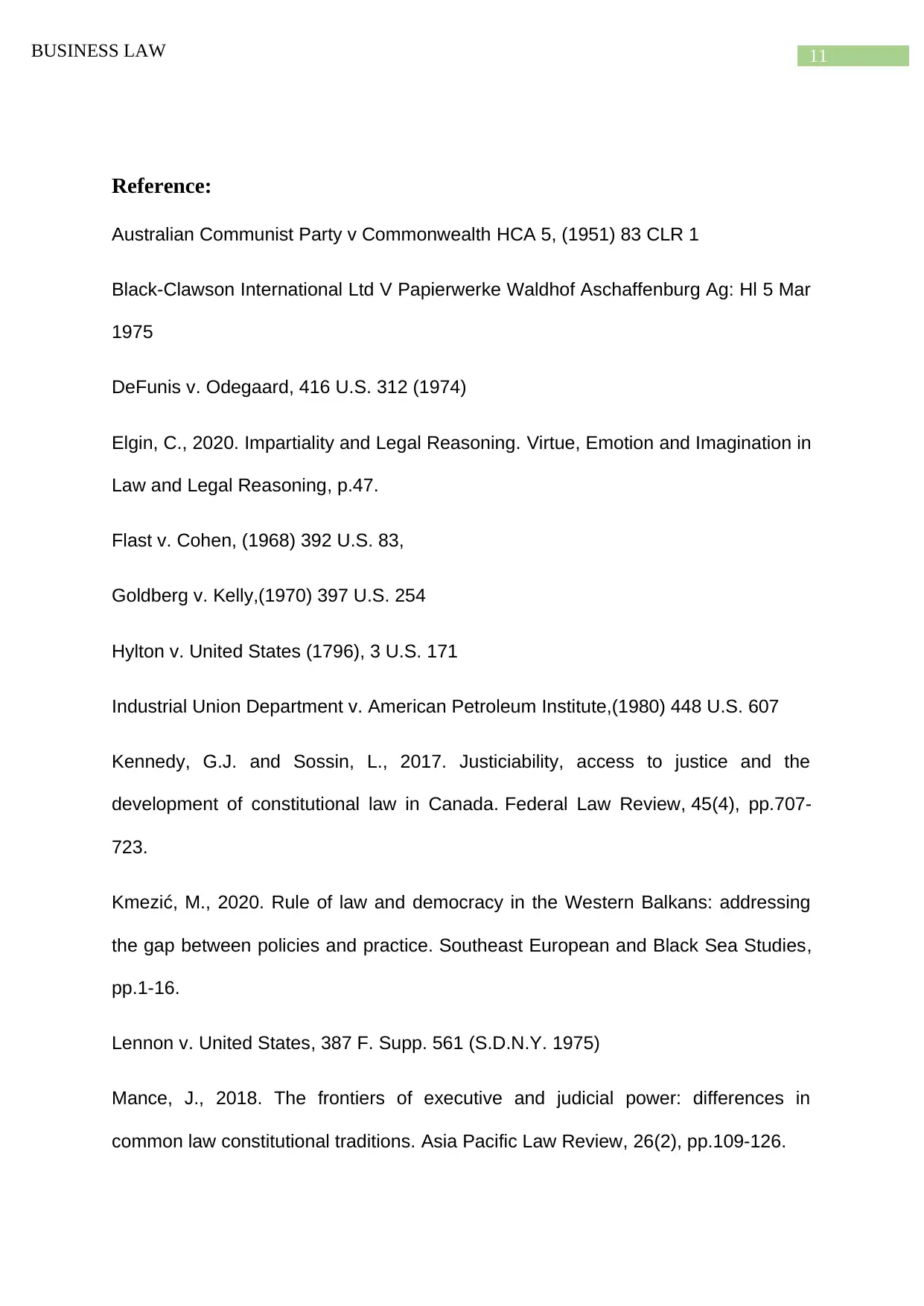
11BUSINESS LAW
Reference:
Australian Communist Party v Commonwealth HCA 5, (1951) 83 CLR 1
Black-Clawson International Ltd V Papierwerke Waldhof Aschaffenburg Ag: Hl 5 Mar
1975
DeFunis v. Odegaard, 416 U.S. 312 (1974)
Elgin, C., 2020. Impartiality and Legal Reasoning. Virtue, Emotion and Imagination in
Law and Legal Reasoning, p.47.
Flast v. Cohen, (1968) 392 U.S. 83,
Goldberg v. Kelly,(1970) 397 U.S. 254
Hylton v. United States (1796), 3 U.S. 171
Industrial Union Department v. American Petroleum Institute,(1980) 448 U.S. 607
Kennedy, G.J. and Sossin, L., 2017. Justiciability, access to justice and the
development of constitutional law in Canada. Federal Law Review, 45(4), pp.707-
723.
Kmezić, M., 2020. Rule of law and democracy in the Western Balkans: addressing
the gap between policies and practice. Southeast European and Black Sea Studies,
pp.1-16.
Lennon v. United States, 387 F. Supp. 561 (S.D.N.Y. 1975)
Mance, J., 2018. The frontiers of executive and judicial power: differences in
common law constitutional traditions. Asia Pacific Law Review, 26(2), pp.109-126.
Reference:
Australian Communist Party v Commonwealth HCA 5, (1951) 83 CLR 1
Black-Clawson International Ltd V Papierwerke Waldhof Aschaffenburg Ag: Hl 5 Mar
1975
DeFunis v. Odegaard, 416 U.S. 312 (1974)
Elgin, C., 2020. Impartiality and Legal Reasoning. Virtue, Emotion and Imagination in
Law and Legal Reasoning, p.47.
Flast v. Cohen, (1968) 392 U.S. 83,
Goldberg v. Kelly,(1970) 397 U.S. 254
Hylton v. United States (1796), 3 U.S. 171
Industrial Union Department v. American Petroleum Institute,(1980) 448 U.S. 607
Kennedy, G.J. and Sossin, L., 2017. Justiciability, access to justice and the
development of constitutional law in Canada. Federal Law Review, 45(4), pp.707-
723.
Kmezić, M., 2020. Rule of law and democracy in the Western Balkans: addressing
the gap between policies and practice. Southeast European and Black Sea Studies,
pp.1-16.
Lennon v. United States, 387 F. Supp. 561 (S.D.N.Y. 1975)
Mance, J., 2018. The frontiers of executive and judicial power: differences in
common law constitutional traditions. Asia Pacific Law Review, 26(2), pp.109-126.
⊘ This is a preview!⊘
Do you want full access?
Subscribe today to unlock all pages.

Trusted by 1+ million students worldwide
1 out of 13
Your All-in-One AI-Powered Toolkit for Academic Success.
+13062052269
info@desklib.com
Available 24*7 on WhatsApp / Email
![[object Object]](/_next/static/media/star-bottom.7253800d.svg)
Unlock your academic potential
Copyright © 2020–2026 A2Z Services. All Rights Reserved. Developed and managed by ZUCOL.